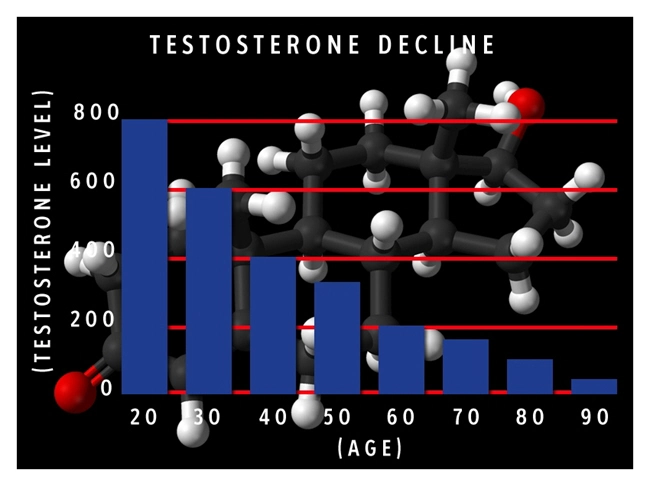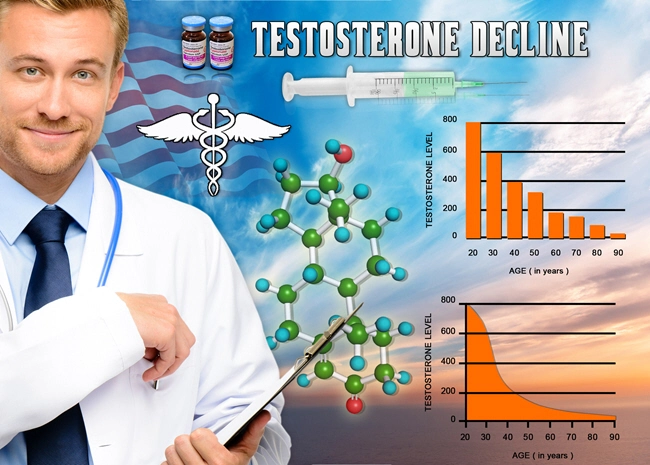
Introduction
Testosterone undecanoate, a long-acting injectable form of testosterone, has been widely used in the treatment of hypogonadism among American men. Recent studies have begun to explore its impact beyond hormonal balance, particularly its effects on cardiovascular health. This article delves into the relationship between testosterone undecanoate and blood flow, providing insights crucial for healthcare providers and patients alike.
Understanding Testosterone Undecanoate
Testosterone undecanoate is an esterified form of testosterone that provides a sustained release of the hormone over several weeks. This formulation is particularly beneficial for maintaining stable testosterone levels, which is essential for men with testosterone deficiency. The drug's long-acting nature reduces the frequency of injections, improving patient compliance and quality of life.
Impact on Blood Flow
Research indicates that testosterone plays a significant role in vascular health. Testosterone undecanoate has been shown to influence endothelial function, which is critical for maintaining healthy blood flow. Endothelial cells line the interior surface of blood vessels and are responsible for vasodilation and vasoconstriction, processes that regulate blood flow.
A study published in the *Journal of Clinical Endocrinology & Metabolism* found that testosterone replacement therapy, including testosterone undecanoate, improved endothelial function in men with hypogonadism. The study demonstrated enhanced flow-mediated dilation, a measure of endothelial function, following treatment. This improvement suggests that testosterone undecanoate could play a role in reducing the risk of cardiovascular diseases by enhancing blood flow.
Cardiovascular Considerations
While the positive effects on endothelial function are promising, it is essential to consider the broader cardiovascular implications of testosterone undecanoate. Some studies have raised concerns about the potential for testosterone therapy to increase the risk of adverse cardiovascular events, such as myocardial infarction and stroke. However, these findings are not consistent across all research, and the overall impact may depend on individual patient factors, including pre-existing cardiovascular conditions.
A meta-analysis published in the *European Heart Journal* reviewed multiple studies and found no significant increase in cardiovascular risk associated with testosterone therapy in men with hypogonadism. This suggests that, when used appropriately, testosterone undecanoate may not pose a substantial risk to cardiovascular health. Nonetheless, regular monitoring and individualized treatment plans are crucial to mitigate potential risks.
Clinical Implications for American Men
For American men considering testosterone undecanoate therapy, understanding its impact on blood flow is vital. Men with hypogonadism may experience improvements in vascular health, potentially reducing their risk of cardiovascular diseases. However, it is essential to weigh these benefits against potential risks, particularly for those with pre-existing heart conditions.
Healthcare providers should conduct thorough assessments, including cardiovascular risk evaluations, before initiating testosterone undecanoate therapy. Monitoring blood flow and endothelial function through regular check-ups can help tailor treatment to the individual needs of each patient, ensuring both safety and efficacy.
Conclusion
Testosterone undecanoate offers a promising treatment option for American men with hypogonadism, with potential benefits extending to improved blood flow and vascular health. While the therapy's impact on cardiovascular risk remains a topic of ongoing research, current evidence suggests that, when used appropriately, it can be a safe and effective option. As with any medical treatment, a personalized approach, guided by regular monitoring and comprehensive patient assessments, is essential for optimizing outcomes.
Contact Us Today For A Free Consultation
Dear Patient,
Once you have completing the above contact form, for security purposes and confirmation, please confirm your information by calling us.
Please call now: 1-800-380-5339.
Welcoming You To Our Clinic, Professor Tom Henderson.

- Testosterone Undecanoate: Enhancing Athletic Performance in American Males [Last Updated On: February 21st, 2025] [Originally Added On: February 21st, 2025]
- Testosterone Undecanoate: Benefits and Risks for American Men's Health [Last Updated On: March 17th, 2025] [Originally Added On: March 17th, 2025]
- Testosterone Undecanoate: A Breakthrough in Andropause Treatment for American Men [Last Updated On: March 17th, 2025] [Originally Added On: March 17th, 2025]
- Optimizing Testosterone Undecanoate Therapy with Diet and Exercise for American Men [Last Updated On: March 18th, 2025] [Originally Added On: March 18th, 2025]
- Testosterone Undecanoate: A Promising Treatment for Chronic Fatigue in American Men [Last Updated On: March 18th, 2025] [Originally Added On: March 18th, 2025]
- Testosterone Undecanoate: Balancing Medical Needs and Cultural Expectations in American Males [Last Updated On: March 19th, 2025] [Originally Added On: March 19th, 2025]
- Testosterone Undecanoate Improves Sleep Quality in American Males with Hypogonadism [Last Updated On: March 20th, 2025] [Originally Added On: March 20th, 2025]
- Testosterone Undecanoate Therapy: Importance of Regular Monitoring for American Men [Last Updated On: March 20th, 2025] [Originally Added On: March 20th, 2025]
- Testosterone Undecanoate: Long-Acting Treatment for Hypogonadism in American Males [Last Updated On: March 21st, 2025] [Originally Added On: March 21st, 2025]
- Testosterone Undecanoate: A Solution for Muscle Loss in Aging American Males [Last Updated On: March 21st, 2025] [Originally Added On: March 21st, 2025]
- Testosterone Undecanoate: A Promising Tool for Weight Management in American Men [Last Updated On: March 21st, 2025] [Originally Added On: March 21st, 2025]
- Testosterone Undecanoate: Safety, Efficacy, and Management in American Men with Hypogonadism [Last Updated On: March 22nd, 2025] [Originally Added On: March 22nd, 2025]
- Testosterone Undecanoate: Effects on Hair Growth in American Males with Hypogonadism [Last Updated On: March 22nd, 2025] [Originally Added On: March 22nd, 2025]
- Testosterone Undecanoate: Enhancing Health and Vitality in American Men [Last Updated On: March 22nd, 2025] [Originally Added On: March 22nd, 2025]
- Testosterone Undecanoate: Impacts on Skin Health in American Males [Last Updated On: March 22nd, 2025] [Originally Added On: March 22nd, 2025]
- Testosterone Undecanoate: Enhancing Cognitive Function in American Men with Hypogonadism [Last Updated On: March 23rd, 2025] [Originally Added On: March 23rd, 2025]
- Testosterone Undecanoate Efficacy and Safety in American Males: Clinical Trial Review [Last Updated On: March 23rd, 2025] [Originally Added On: March 23rd, 2025]
- Testosterone Undecanoate's Impact on Joint Health in American Men: Benefits and Risks [Last Updated On: March 23rd, 2025] [Originally Added On: March 23rd, 2025]
- Testosterone Undecanoate's Impact on Immune Function in American Males: A Comprehensive Review [Last Updated On: March 23rd, 2025] [Originally Added On: March 23rd, 2025]
- Testosterone Undecanoate's Impact on Vision: Benefits and Risks for American Men [Last Updated On: March 24th, 2025] [Originally Added On: March 24th, 2025]
- Testosterone Undecanoate: A Promising Treatment for Osteoporosis in American Men [Last Updated On: March 24th, 2025] [Originally Added On: March 24th, 2025]
- Testosterone Undecanoate's Impact on Respiratory Health in American Men with Hypogonadism [Last Updated On: March 24th, 2025] [Originally Added On: March 24th, 2025]
- Testosterone Undecanoate: Enhancing Metabolic Health in American Males with Hypogonadism [Last Updated On: March 24th, 2025] [Originally Added On: March 24th, 2025]
- Testosterone Undecanoate's Impact on Dental Health in American Males: A Review [Last Updated On: March 24th, 2025] [Originally Added On: March 24th, 2025]
- Testosterone Undecanoate's Impact on Cholesterol Levels in American Men: A Comprehensive Review [Last Updated On: March 24th, 2025] [Originally Added On: March 24th, 2025]
- Testosterone Undecanoate: Dispelling Myths and Enhancing Men's Health [Last Updated On: March 24th, 2025] [Originally Added On: March 24th, 2025]
- Testosterone Undecanoate: Tailoring TRT for Diverse American Male Demographics [Last Updated On: March 24th, 2025] [Originally Added On: March 24th, 2025]
- Testosterone Undecanoate's Impact on Digestive Health in American Males: Insights and Management [Last Updated On: March 24th, 2025] [Originally Added On: March 24th, 2025]
- Economic Impact of Testosterone Undecanoate on Healthcare Costs for American Men with Hypogonadism [Last Updated On: March 25th, 2025] [Originally Added On: March 25th, 2025]
- Testosterone Undecanoate: Impacts on Longevity and Male Health [Last Updated On: March 26th, 2025] [Originally Added On: March 26th, 2025]
- Testosterone Undecanoate: Enhancing Injury Recovery in American Males [Last Updated On: March 26th, 2025] [Originally Added On: March 26th, 2025]
- Testosterone Undecanoate's Impact on Liver Health in American Males: A Comprehensive Review [Last Updated On: March 26th, 2025] [Originally Added On: March 26th, 2025]
- Testosterone Undecanoate: Enhancing Fertility in American Men with Hypogonadism [Last Updated On: March 26th, 2025] [Originally Added On: March 26th, 2025]
- Testosterone Undecanoate: Enhancing Emotional Well-being in American Males [Last Updated On: March 26th, 2025] [Originally Added On: March 26th, 2025]
- Testosterone Undecanoate Enhances Cognitive Function in American Men: Research and Implications [Last Updated On: March 26th, 2025] [Originally Added On: March 26th, 2025]
- Testosterone Undecanoate: Enhancing Life Quality in American Male Cancer Survivors [Last Updated On: March 26th, 2025] [Originally Added On: March 26th, 2025]
- Testosterone Undecanoate: A Promising Therapy for Chronic Pain in American Males [Last Updated On: March 26th, 2025] [Originally Added On: March 26th, 2025]
- Testosterone Undecanoate: Benefits, Side Effects, and Management Strategies for American Men [Last Updated On: March 26th, 2025] [Originally Added On: March 26th, 2025]
- Testosterone Undecanoate: Benefits and Management for American Men with Hypogonadism [Last Updated On: March 27th, 2025] [Originally Added On: March 27th, 2025]
- Testosterone Undecanoate's Impact on Blood Pressure in American Men: A Comprehensive Review [Last Updated On: March 27th, 2025] [Originally Added On: March 27th, 2025]
- Testosterone Undecanoate: Enhancing Sexual Health in American Men with Low Testosterone [Last Updated On: March 27th, 2025] [Originally Added On: March 27th, 2025]
- Testosterone Undecanoate Boosts Endurance in American Men: Mechanisms and Benefits [Last Updated On: March 27th, 2025] [Originally Added On: March 27th, 2025]
- Testosterone Undecanoate: A Promising Therapy for Diabetes Management in American Males [Last Updated On: March 27th, 2025] [Originally Added On: March 27th, 2025]
- Testosterone Undecanoate: A Promising Treatment for Allergies in American Males [Last Updated On: March 27th, 2025] [Originally Added On: March 27th, 2025]
- Testosterone Undecanoate: Managing Hypogonadism and Its Reproductive Health Impacts in American Males [Last Updated On: March 28th, 2025] [Originally Added On: March 28th, 2025]
- Testosterone Undecanoate: Managing Stress in American Males [Last Updated On: March 28th, 2025] [Originally Added On: March 28th, 2025]
- Testosterone Undecanoate's Impact on Kidney Health in American Men: A Comprehensive Review [Last Updated On: March 28th, 2025] [Originally Added On: March 28th, 2025]
- Testosterone Undecanoate: Enhancing Veterans' Health with Long-Acting Therapy [Last Updated On: March 28th, 2025] [Originally Added On: March 28th, 2025]
- Testosterone Undecanoate's Impact on Hearing in American Males: A New Frontier in Hormone Therapy [Last Updated On: March 28th, 2025] [Originally Added On: March 28th, 2025]
- Testosterone Undecanoate Enhances Nail Health in American Males: A Comprehensive Study [Last Updated On: March 29th, 2025] [Originally Added On: March 29th, 2025]
- Testosterone Undecanoate: Dosage Adjustments for American Men's Optimal Hormone Levels [Last Updated On: March 30th, 2025] [Originally Added On: March 30th, 2025]
- Testosterone Undecanoate Enhances Skin Elasticity in American Men: A Comprehensive Review [Last Updated On: March 31st, 2025] [Originally Added On: March 31st, 2025]
- Testosterone Undecanoate Therapy and Hair Loss in American Men: Risks and Management [Last Updated On: March 31st, 2025] [Originally Added On: March 31st, 2025]
- Monitoring Testosterone Undecanoate: Key Parameters and Lifestyle for American Men's Health [Last Updated On: April 1st, 2025] [Originally Added On: April 1st, 2025]
- Testosterone Undecanoate Boosts Immune Function in American Men: Emerging Research [Last Updated On: April 4th, 2025] [Originally Added On: April 4th, 2025]
- Testosterone Undecanoate: Enhancing Body Composition and Health in American Males [Last Updated On: April 5th, 2025] [Originally Added On: April 5th, 2025]
- Testosterone Undecanoate: A Promising Therapy for Anxiety in American Males [Last Updated On: April 5th, 2025] [Originally Added On: April 5th, 2025]
- Testosterone Undecanoate's Impact on Coagulation in American Males: Risks and Management [Last Updated On: April 7th, 2025] [Originally Added On: April 7th, 2025]
- Testosterone Undecanoate: Impacts on Heart Rate and Cardiovascular Health in American Men [Last Updated On: April 9th, 2025] [Originally Added On: April 9th, 2025]
- Testosterone Undecanoate: Enhancing Muscle Recovery in American Men [Last Updated On: April 9th, 2025] [Originally Added On: April 9th, 2025]
- Testosterone Undecanoate's Impact on Blood Sugar Levels in American Males [Last Updated On: April 10th, 2025] [Originally Added On: April 10th, 2025]
- Testosterone Undecanoate: Enhancing Muscle Strength in American Men [Last Updated On: April 10th, 2025] [Originally Added On: April 10th, 2025]
- Testosterone Undecanoate: Enhancing Bone Healing in American Men [Last Updated On: April 11th, 2025] [Originally Added On: April 11th, 2025]
- Testosterone Undecanoate's Impact on Skin Pigmentation in American Males: A Comprehensive Review [Last Updated On: April 11th, 2025] [Originally Added On: April 11th, 2025]
- Testosterone Undecanoate: A Promising Treatment for Depression in American Males with Low Testosterone [Last Updated On: April 11th, 2025] [Originally Added On: April 11th, 2025]
- Testosterone Undecanoate: Managing Side Effects for Optimal TRT in American Men [Last Updated On: April 13th, 2025] [Originally Added On: April 13th, 2025]
- Testosterone Undecanoate: Enhancing Wound Healing in American Men [Last Updated On: April 15th, 2025] [Originally Added On: April 15th, 2025]
- Testosterone Undecanoate's Impact on Thermoregulation in American Males: A Comprehensive Review [Last Updated On: April 15th, 2025] [Originally Added On: April 15th, 2025]
- Testosterone Undecanoate: Benefits and Risks for American Men's Health [Last Updated On: April 15th, 2025] [Originally Added On: April 15th, 2025]
- Testosterone Undecanoate's Impact on Appetite in American Males: A Comprehensive Review [Last Updated On: April 15th, 2025] [Originally Added On: April 15th, 2025]
- Optimizing Testosterone Undecanoate Therapy: Lifestyle Adjustments for American Men [Last Updated On: April 17th, 2025] [Originally Added On: April 17th, 2025]
- Testosterone Undecanoate Enhances Skin Hydration in American Males with Hypogonadism [Last Updated On: April 18th, 2025] [Originally Added On: April 18th, 2025]









